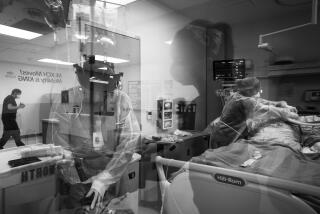England sees 60% drop in coronavirus cases amid vaccinations and lockdown

- Share via
LONDON — Britain’s COVID-19 vaccination program is beginning to break the link between infection and serious illness or death, according to the latest results from an ongoing study of the pandemic.
Researchers at Imperial College London found that infections in England dropped about 60% in March as lockdown measures slowed the spread of the coronavirus. People 65 and older were the least likely to be infected as they benefited most from the vaccination program, which initially focused on older people.
The study (which did not include Scotland and Wales) also found that the relationship between infections and deaths is diverging, “suggesting that infections may have resulted in fewer hospitalizations and deaths since the start of widespread vaccination.”
The positive news came amid renewed scrutiny of vaccinations after the British government on Wednesday revised its policy on the AstraZeneca shot; it will offer people younger than 30 an alternative inoculation. The change followed studies suggesting that the shot might be linked to very rare blood clots.
Health Secretary Matt Hancock told Sky News that the public should be reassured by the abundance of caution demonstrated by authorities to make sure that the vaccine rollout was as safe as possible.
“What we’ve learned in the last 24 hours is that the rollout of the vaccine is working. We’ve seen that the safety system is working, because the regulators can spot even this extremely rare event — four in a million — and take necessary action to ensure the rollout is as safe as it possible can be,” he said. “And we are seeing that the vaccine is working. It’s breaking the link between cases and deaths.”
British lawmakers have agreed to prolong coronavirus emergency measures for six months, allowing the Conservative government to keep its unprecedented powers to restrict U.K. citizens’ everyday lives.
Some 31.7 million people in Britain had been given a first dose by Tuesday, or just over 60% of the country’s adult population.
But Imperial College researchers also urged caution, saying that infection rates leveled off at the end of the study period as the government began to ease the national lockdown and children returned to school. Future rounds of the study will assess the effect that further easing of restrictions has had on infection rates.
The next step in lifting England’s lockdown is scheduled for Monday, when nonessential shops will be allowed to reopen, along with hair salons, gyms and outdoor service at pubs and restaurants. Scotland and Wales are following their own schedules.
The findings are based on data gathered by the 10th round of Imperial College’s Real-Time Assessment of Community Transmission study, which conducts swab tests on a random sample of people across England each month. The latest round tested more than 140,000 people from March 11 to March 30.
Even though Britain has had one of the world’s fastest vaccine rollouts, its death toll from the pandemic is the highest in Europe, at more than 127,000.
More to Read
Sign up for Essential California
The most important California stories and recommendations in your inbox every morning.
You may occasionally receive promotional content from the Los Angeles Times.











